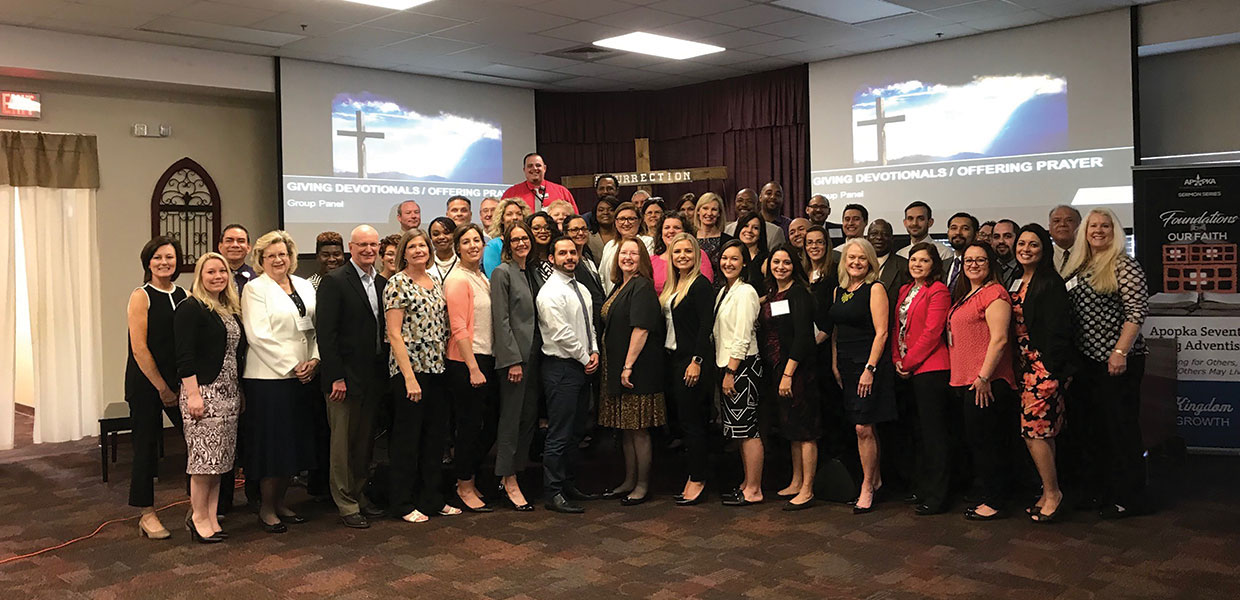
In health care, the spiritual needs of patients are an often-under-addressed part of their health that can drastically influence their overall well-being. In fact, research shows that people who are more religious or spiritual experience better overall health compared to those who are less so. Knowing this, Adventist Health System (AHS) embarked on a journey to enhance the way spiritual care is delivered through a purposeful focus on spiritual health in the outpatient setting.
To this end, the organization recently hired and trained a team of clinical mission integration (CMI) specialists to equip them with the tools, knowledge, and infrastructure they need to support providers and front-line staff in the delivery of spiritual care in the outpatient setting. More than three dozen CMI specialists from across the organization took part in the training, which included presentations from AHS leaders, overviews on the foundational principles of spiritual care, and sessions on physician engagement and well-being.
In addition, Adventist Health System will integrate three questions to assess the “spiritual wholeness” or “well-being” of a patient into the patient’s electronic medical record (EMR) to assure that providers can account for how the spiritual condition impacts their health. The questions specifically ask about the patient’s condition related to love, joy, and peace in their lives. Each issue is mapped to other specific health issues that may be affected by the answer a patient gives, and the CMI team is alerted when there is a concern regarding their answers.
“We aspire to make every patient interaction a spiritual encounter, and in doing so, it is very important that we provide the infrastructure that will enable our CMI team to support the providers and front-line staff members who will be engaging patients in their spiritual health,” said Terry Shaw, president/CEO for Adventist Health System. “This new program will allow us to bring spiritual care to where we serve the majority of our patients each year.”
While spiritual care has traditionally been provided by chaplains in the hospital setting, today many more patients are receiving care in the outpatient setting. In fact, more than 90 percent of patient interactions across Adventist Health System take place in outpatient sites such as physician practices, urgent care facilities, and rehabilitation centers.
Upon completion of the training, CMI specialists began serving in markets across Adventist Health System’s 10-state footprint. Much of their work is training and supporting care providers and staff in the delivery of spiritual care to patients who wish to receive it; fostering care environments that reflect the organization’s mission of “Extending the Healing Ministry of Christ”; and focusing on wholeness, building strong relationships, and serving as liaisons between providers and the clinical mission integration team.
Adventist Health System’s enhanced focus on spiritual care in the outpatient setting is inspired, in part, by the results of its year-long study that examined the attitudes and practices of care providers as they relate to the integration of spirituality in patient care. The study, published in multiple medical journals, showed that a majority of providers are willing to assess the spiritual needs of patients, and that providers who receive training on how to appropriately engage patients on spirituality are twice as likely to regularly conduct spiritual assessments.
“We have known for some time that the vast majority of patients welcome discussions with their doctors about their faith and spiritual health,” said Ted Hamilton, M.D., senior vice president of mission and ministry and chief mission integration officer for Adventist Health System. “With the study revealing that providers are willing to address this very important aspect of a patient’s health, we are encouraged and excited to provide the groundwork and resources to help fully meet the needs of our patients through a care experience that is wholistic and comprehensive.”
Adventist Health System | July 2018



Comments are closed.